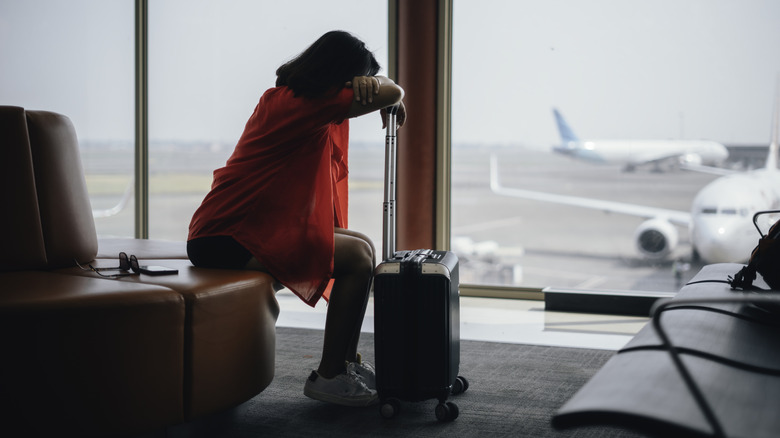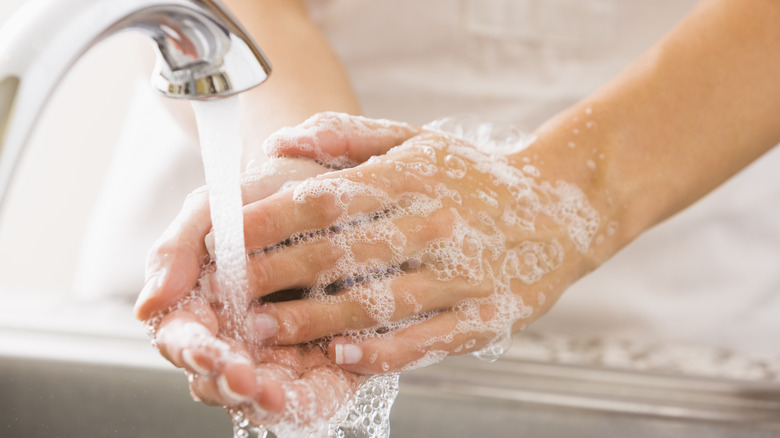There's One Reliable Way To Avoid Contracting Norovirus On Your Vacation, And It Isn't Hand Sanitizer
Traveling means stepping out of your comfort zone — and unfortunately, that also means exposing yourself to all sorts of illnesses. Food poisoning? A real risk, especially on a cruise. A nasty cold is not out of the question, and so is catching a stomach bug. And let's not forget the dreaded post-vacation sickness that somehow sneaks up on you once you're home. But if there's one travel sickness with a truly notorious reputation, it's norovirus — a brutal infection known for causing relentless vomiting and diarrhea. And no, spritzing hand sanitizer here and there won't save you. Experts insist that thorough handwashing is your best defense.
"Norovirus is characterized by severe vomiting," William Schaffner, professor of preventive medicine and infectious diseases at Vanderbilt University School of Medicine, explained to Newsweek. "The first symptom of many patients is sudden, unexpected, explosive vomiting, and then that vomiting continues. It can be accompanied by diarrhea, and dehydration is a concern, particularly for the very young and for older people who are frail and who have chronic underlying illnesses, such as diabetes." Some believe norovirus is just a cruise ship problem, but that couldn't be further from the truth.
The CDC reports around 2,500 outbreaks in the U.S. annually, with norovirus responsible for half of all foodborne illnesses. The National Foundation for Infectious Diseases adds that the virus leads to 109,000 hospitalizations and 900 deaths each year. And in just the first few weeks of 2025? Over 200 outbreaks have already been recorded. While norovirus may seem like just another stomach bug, don't underestimate it. It spreads easily and hits harder than you'd like. And while a hand sanitizer does help, soap and water are still non-negotiable. That is if you want to avoid a nasty souvenir from your trip, of course.
Washing your hands thoroughly is the way to go
If you need a reason to take handwashing seriously, just look at how norovirus spreads, as it is ridiculously easy to catch. Like most viruses, it thrives on carelessness. One wrong move, and boom — you're down for the count. "Norovirus is extremely contagious, and is usually transmitted between people via close contact, but often via surfaces, utensils or foods that are contaminated with the virus," Chad D. Neilsen, MPH, director of Infection Prevention and Control at Nemours Children's Health in Florida, shared with Fox News Digital.
And since you have no idea where the surfaces around you have been (or who's been touching them), handwashing isn't just a good idea — it's essential. The CDC stresses the importance of scrubbing your hands with soap and water for at least 20 seconds, no quick rinses whatsoever. "The soap is a great detergent to remove the virus from your hands," Shanna Miko, a nurse epidemiologist at CDC, told NPR. And yes, it goes without saying that you need to do this multiple times a day, but especially before and after handling food, taking medication, or using the bathroom. Hand sanitizer should never be deemed as a suitable replacement. At best, it should only be an extra layer of protection, not your main line of defense.
Scrubbing your hands for less time than it takes to play a song (okay, maybe not "Happy Birthday") is a small sacrifice if it means avoiding days of misery, clutching a trash can. If you want to keep norovirus far, far away, wash your hands — frequently and properly. Your future self will be very grateful.

